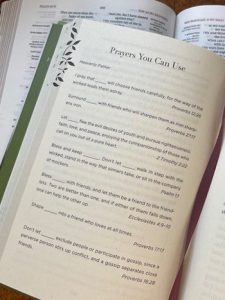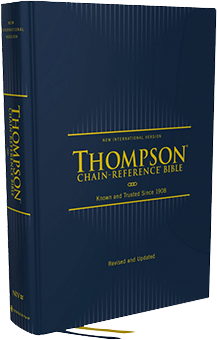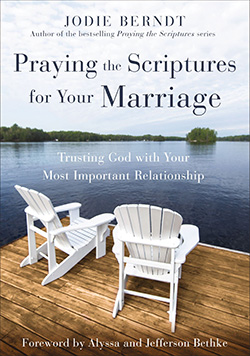
How the TCR Shaped My Prayer Life (with Treasure that is New and Old)
I got my first Thompson Chain-Reference Bible (TCR) in the late 1980’s, right around the time our eldest daughter was born. I found myself drawn to things like the book-by-book outlines, the colored maps, and the concordance—all features I found comforting and familiar. What was new (and to be honest, a little intimidating) was the “chain-reference” system.
I wasn’t sure if I would like it. Or even understand it. I was not a professional minister, a seminary grad, or even a small group leader at Bible study.
I was just a young mom, wanting to get to know God and figure out how to pray for my family.
At the time, I didn’t know all that much about prayer. I figured it was basically a one-way conversation in which I’d ask God for what I thought would be good for my kids or my marriage and wait to see what happened. If our circumstances or relationships lined up with my requests, I would know that God said yes. And if not, he said no.
I didn’t begrudge God when he turned me down (I knew verses like Isaiah 55:9, which explains that God’s ways and his thoughts are higher than ours), but I much preferred it when I’d put in a prayer and get the answer I wanted.
I liked it when prayer worked like a vending machine.
But that’s not, as it turns out, how Jesus sees prayer. I read John 15 and found myself stopping short, captivated by the Lord’s invitation to “remain” in his love—and to use that connection to give purpose and power to my prayers.
“If you remain in me,” Jesus says in John 15:7, “and my words remain in you, ask whatever you wish, and it will be done for you.”
Put another way, the more we dig into Scripture, letting the words we read penetrate our thoughts and shape our perspective, the more our longings will start to reflect what God already wants to do—and the more we can pray with the wholehearted expectation that God will answer.
So, what does it look like, in practical terms, to let the Bible shape our desires and requests?
For starters, we might consider the people we meet in the pages of Scripture. We had four kids in six years, and I used the character studies in the back of my Thompson Chain-Reference Bible to expand my vision as I asked God to work in their lives:
May they trust you, Lord, and be obedient like Abraham. (Genesis 22:3-10)
Make them quick to confess sin so they can have joy in your presence like David. (Psalm 51)
Grant them wisdom like Daniel, and bless them with courageous and faithful friends. (Daniel 1:17-20)
 I read about Moses’ mother putting her baby in a basket in the river and there, in the margins of Exodus 2, I saw entry number 1624—Maternal Love—along with the next “link” in the chain: Ruth 4:16, which describes Naomi caring for the long-awaited child of Ruth and Boaz, and then 1 Samuel 2:19. That’s the verse about how Hannah made a little robe for her son Samuel every year and took it with her when she and her husband went up to Shiloh, where the boy lived. These women trusted God to care for their children, and their stories—chronicled link by link in my Bible—filled me with hope. I realized that I could go through each of the readings—each link in the chain—or I could turn to the back of the Bible, find No. 1624, and access everything there.
I read about Moses’ mother putting her baby in a basket in the river and there, in the margins of Exodus 2, I saw entry number 1624—Maternal Love—along with the next “link” in the chain: Ruth 4:16, which describes Naomi caring for the long-awaited child of Ruth and Boaz, and then 1 Samuel 2:19. That’s the verse about how Hannah made a little robe for her son Samuel every year and took it with her when she and her husband went up to Shiloh, where the boy lived. These women trusted God to care for their children, and their stories—chronicled link by link in my Bible—filled me with hope. I realized that I could go through each of the readings—each link in the chain—or I could turn to the back of the Bible, find No. 1624, and access everything there.
I began to love researching topics this way; it felt like a treasure hunt, one that never failed to yield gold. My gratitude grew when I landed a book contract in 1999 and began writing Praying the Scriptures for Your Children. Back then, there was no such thing as a “search engine” or any helpful resources like BibleGateway. But that was okay; the Thompson Chain-Reference Bible cataloged all my concerns—everything from my kids’ friendships to their faith—and pointed me to the relevant verses.
My prayer life took on a whole new dimension. I developed a richer and more full understanding of the verses that animated my desires and gave life to my prayers. I felt equipped to slip my hand into God’s, partnering with him to accomplish his purposes in my family’s life, even as I encouraged others to do the same thing by praying the scriptures for their own children.
 Over the years, my passion for praying the Bible—instead of just reading it—has continued to grow. I’ve just released the fifth book in the Praying the Scriptures series, one designed to help us pray for our marriages. As with the earlier books, I found myself scouring the pages of my Bible, gleaning wisdom on everything from handling conflict to managing money to walking through hard seasons of suffering or grief, and turning these verses into prayers:
Over the years, my passion for praying the Bible—instead of just reading it—has continued to grow. I’ve just released the fifth book in the Praying the Scriptures series, one designed to help us pray for our marriages. As with the earlier books, I found myself scouring the pages of my Bible, gleaning wisdom on everything from handling conflict to managing money to walking through hard seasons of suffering or grief, and turning these verses into prayers:
Remind us that the tongue can bring life or death; help us choose life-giving words (Proverbs 18:21)
Spread your protection over us; surround us with your favor as with a shield. (Psalm 5:11-12)
May our love increase and overflow for each other and for everyone else. (1 Thessalonians 3:12)
 I still have my original Thompson Chain-Reference Bible. A few of its pages are ripped (reading with a toddler on your lap can do that!), its margins are full from where I’ve made notes of my prayers, and the leather cover hangs together by a few strips of duct tape. But I’m not giving it up; we have history together.
I still have my original Thompson Chain-Reference Bible. A few of its pages are ripped (reading with a toddler on your lap can do that!), its margins are full from where I’ve made notes of my prayers, and the leather cover hangs together by a few strips of duct tape. But I’m not giving it up; we have history together.
I am, however, making room on my nightstand for the new, updated version of the Thompson Chain-Reference Bible. I ordered the NIV version and I’m starting fresh—highlighting new links in the margins, recording dates as I pray, and rediscovering what Jesus meant in Matthew 13:52: God’s Word is a storeroom of treasure, both new and old.

The Thompson Chain-Reference Bible
The Thompson Chain Reference Bible is an ideal tool for comprehensive topical study with more than 100,000 Scripture references covering over 8,000 topics. This beloved study Bible has been enriching the spiritual hearts and minds of believers for over 100 years!
Learn More
Praying the Scriptures for Your Marriage
Praying the Scriptures for Your Marriage equips you with powerful and life-changing prayers that will strengthen your marriage and help you discover the peace, provision, and joy that comes from trusting God with your most important relationship.
Learn More






